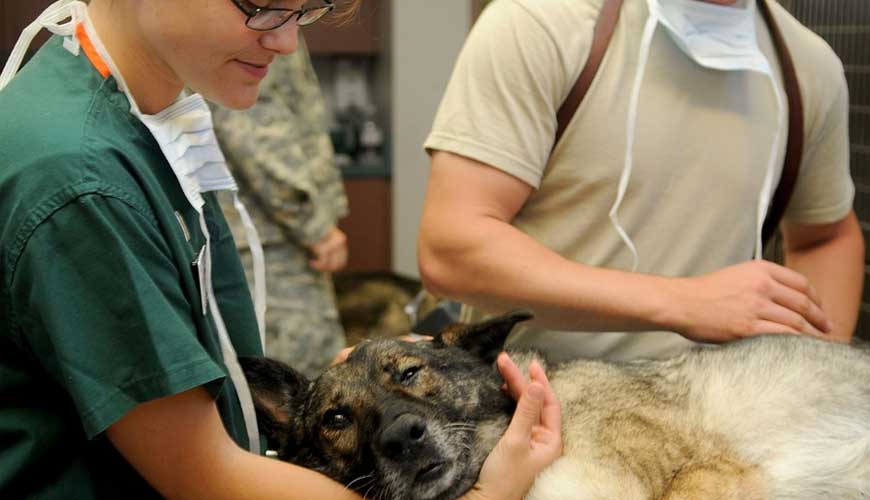OVERSEAS VETERINARY ADMISSION

About this subject
Veterinary medicine is the branch of medicine dealing with the study, prevention and treatment of diseases in animals. It is an old industry, with the first Veterinary textbook being written in 500AD (however the science was present in society long beforehand, with Ancient Egyptian Hieroglyphics depicting trained workers providing medical attention to their cattle).
Since then, there has been a significant shift in the roles of those who study veterinary science, and these days the majority of vets opt to focus on treating domestic animals such as cats and dogs. However, this is not the only door open to those with a degree in Veterinary Medicine; many graduates go on to specialise in the treatment of working on exotic animals, which can lead to a wide range of travel opportunities
Is this the course for me?
The most important thing to consider when deciding whether or not veterinary medicine is the right course for you is your attitude towards animals. Throughout your time as a student, you will be expected to interact with a wide range of animals, and as such it is vital that you are passionate about all species.
Veterinary medicine is an incredible complex subject; some would argue that it is even more difficult than the study of medicine for humans. As part of your course you will be expected to learn about a large number of diseases for numerous species. You will be expected to put in a lot of extra hours outside of lectures, and complete work placements during the holidays.
There are only 7 accredited Veterinary Schools in the UK, all of which require top level grades. Those with a track record of high academic achievement, who are willing to work hard and are passionate about animals, will find veterinary science a fascinating and rewarding course.
Careers prospects
Although veterinary science is a demanding subject, it is one which is incredibly sought after; this means that post-graduation, there are a lot of career prospects. The majority of students will end up working in a veterinary practice of some sort, whether working with domestic or working animals.
For students and potential graduates with a more adventurous streak, a degree in veterinary sciences also allows you the opportunity to travel and work with more exotic animals.
Similarly, there are some graduates who decide not to work in a veterinary practice, but instead opt to work in research or conservation related fields, particularly biomedical research. With the average graduate in the UK earning £25,807 per year and a 91-94% graduate employment rate, a degree in veterinary medicine is definitely worth considering. However salaries may vary depending upon country of work.
Studying Vetinary Medicine
With a wide range of career prospects and an estimated staring salary of £25,807 per year in the UK, it is no surprise that veterinary science is a competitive course to be accepted on. In the UK, there are only 7 veterinary courses, and they all look very similar in terms of module options as they have to be approved by the Royal Veterinary College.
The average veterinary degree will take 5 years to complete, with postgraduate courses lasting a minimum of a year. Some degree courses allow you the possibility of extending your study for an extra year in order to specialise in a specific field. The University of Cambridge however only offers a course that runs for 6 years.
Between the universities, there is little discrepancy between entry level requirements for graduates. If you are a non-native English speaker, then you will be expected to score a minimum of 6.5 on your IELTS test as well as having exceptionally high marks in chemistry, maths and biology. Some universities also require candidates to sit the Bio-Medical Admissions Test in order to see if they are suitable for the course.
6 of the 7 universities offering the veterinary science course expect those educated in the UK to achieve 3 A*s – A’s at A-level; those from an international background are expected to achieve the academic equivalent in order to be accepted on a degree programme. Postgraduate courses will require a 2.1 degree before allowing students to start studying.
Where to study?
One of the benefits of deciding where you’re going to study veterinary medicine is that in the UK there are only 7 schools to choose from. The drawback is that all of these establishments have similar course requirements, similar modules and are fiercely competitive. The situation in Australia, Ireland and New Zealand is very similar, but it is still worth applying. Veterinary courses in European countries such as Sweden are less competitive, but equally as prestigious and as such are well worth considering.
Another consideration to take into account is the cost of your course. Give that a veterinary course can last 6 years, it is important to budget accordingly. In central European countries, the course fees and living prices are often lower, whereas Australian veterinary schools opt to charge higher fees.
It is also important that if you’re applying to study away from home, you check where your qualification is valid. Most countries will allow vets to practice as long as they have attained their degree from a reputable institution, but it doesn’t hurt to double check.
Most of all, it is important to choose somewhere that will make you happy for the duration of your course, particularly if you’re opting to live away from home. It is important not only to discover the academic benefits of studying at a particular institution, but also whether the surrounding culture will add to the pleasure of your university years. Wherever you choose to study, your degree will end up costing you a lot of money, so you need to ensure that you get the most out of your time as a student.
Of course if you’re struggling to secure funding, there are a number of scholarships and grants available.

 Over 10 years of experience we’ll ensure you always get the best guidance.
Over 10 years of experience we’ll ensure you always get the best guidance.
